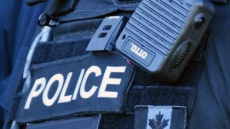VANCOUVER - Canadian researchers have led a study suggesting infants be tested for autism spectrum disorder before symptoms appear if an older sibling has already been diagnosed with the neurobiological condition.
The odds of a younger sibling having autism are up to 20 per cent, but most children miss out on early intervention for challenges in behaviour and communication because they're often not diagnosed until age four, previous studies have shown.
Research by Dr. Stephen Scherer, senior scientist and director of the Centre for Applied Genomics at the Hospital for Sick Children in Toronto, and Dr. Lonnie Zwaigenbaum, a professor of pediatrics at the University of Alberta, found a standard blood test analyzing the DNA of infants with a sibling who's been diagnosed with autism would provide earlier information for families.
The findings were published Thursday in the journal Nature Communications.
They involve 288 infant siblings from Canada and the United States showing that by age three, 157 of the children were either diagnosed with autism spectrum disorder or developing atypically. Of the 157 children, seven per cent were carrying a gene that put them at a very high risk of developing autism.
Of the seven per cent of kids, 50 per cent were diagnosed with autism by age three and an additional 35 per cent had other developmental challenges.
Scherer said families of autistic children are often concerned about whether a sibling could also be at risk.
"It's the number one question families have and no one's ever wrapped any statistics around that and that's what we present for the first time, with this paper," he said.
Further genetic testing looking at the entire genome, beyond a blood test called microarray analysis, is being conducted with all the families in the study in hopes it will provide more information about the risk of autism, Scherer said.
The participants were part of the Baby Siblings Research Consortium, which includes independent research groups in Canada, the United States and Europe, though this study included 10 sites in North America, four of them in Canada, Zwaigenbaum said of the testing that is part of an ongoing decade-long research project looking at behavioural predictors of autism.
"Based on the findings of the study, we're suggesting that the test be focused on younger siblings," he said. "What we're arguing is that it could be informative at a time where we're not likely to see any behavioural signs. So it provides an option for presymptomatic testing to identify infants at highest risk."
Families who are informed about a younger child's risk of autism could initiate strategies to help children develop early communication skills before assessment of behaviour by a specialist and intervention by a therapist as part of a cost-effective approach to care, Zwaigenbaum said.
"I think we may be moving to an exciting new time where both biomarkers and developmental surveillance can provide complementary information to help us identify infants at risk."
Further research could lead to a change in practice recommending siblings be given the readily available test for autism, he said.
The study also found that children did not necessarily inherit or share all the genetic variants with an older sibling with autism, which is consistent with previous research.
Long wait lists for assessment of children exhibiting signs of autism is a major concern among families across Canada, and both Scherer and Zwaigenbaum acknowledged that is problematic.
"It's not happening fast enough but we can't hold back the science because of it," Scherer said.
"The current system doesn't have the capacity to respond but (the study) definitely moves the needle in terms of the potential to develop strategies that could be applied presymptomatically," Zwaigenbaum said. "It really further accelerates the move to earlier and earlier intervention."

